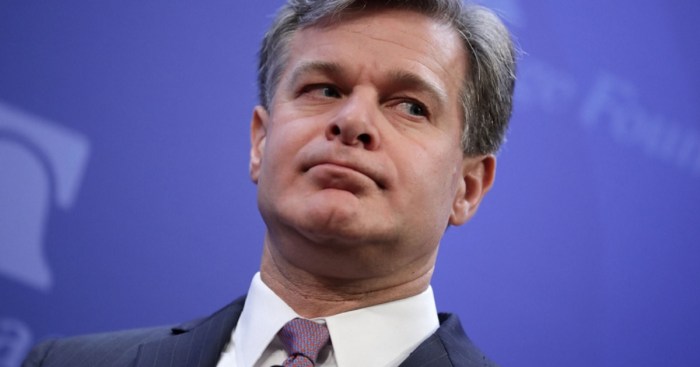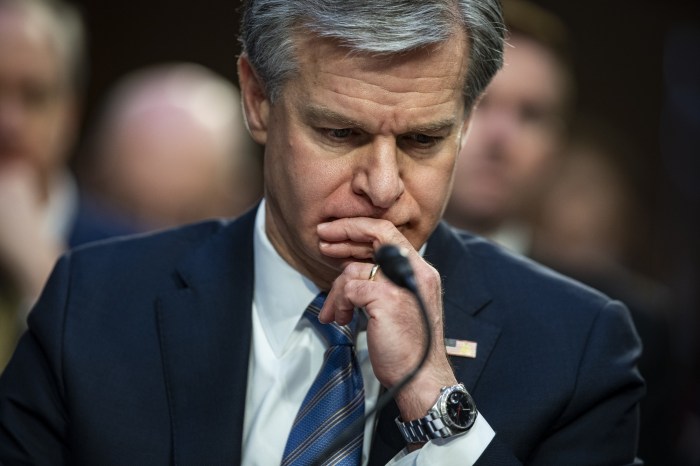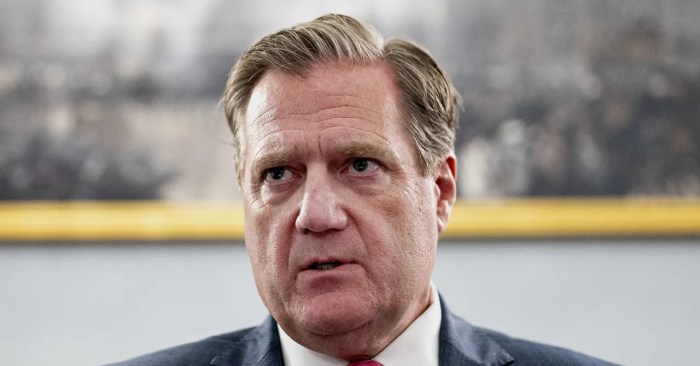FBI spy fears US Congress: The whispers have escalated into a full-blown roar. This isn’t your grandpappy’s Cold War paranoia; this is about alleged surveillance targeting lawmakers themselves, shaking the foundations of American democracy. We’re diving deep into the historical context, exploring the specific anxieties fueling these fears, and examining the potential impact on both Congress and public trust. Get ready for a rollercoaster ride through power plays, potential abuses, and the ongoing battle for transparency.
From historical precedents of FBI surveillance to modern-day anxieties fueled by technological advancements, we’ll unpack the complexities of this situation. We’ll analyze the legal frameworks, the potential motivations behind any alleged surveillance, and the very real consequences of unchecked power. We’ll also look at international comparisons and best practices to see how other nations handle similar issues, offering potential solutions and reforms to prevent future abuses.
Historical Context of FBI Surveillance and Congressional Concerns
The relationship between the FBI and Congress has been a complex and often fraught one, marked by periods of cooperation and intense scrutiny. The FBI’s mandate to investigate potential threats to national security inevitably brings it into contact with lawmakers, and the potential for conflict arises from the inherent tension between legislative oversight and executive branch investigations. This tension has played out repeatedly throughout history, shaping the legal frameworks and public perception surrounding FBI surveillance of Congress.
The history of FBI surveillance of Congress is long and multifaceted, revealing a dynamic interplay between national security concerns and the principles of democratic accountability. While justified at times by legitimate national security imperatives, such surveillance has also raised serious questions about the balance of power and the potential for abuse. Understanding this history is crucial to assessing contemporary concerns.
The FBI’s alleged spying on Congress is raising serious questions about government overreach, echoing similar concerns about censorship. This brings to mind the chilling possibility that, as reported in this article on Texas potentially censoring abortion-related posts , tech giants could become tools for suppressing dissent. Ultimately, both scenarios highlight a dangerous trend of controlling information flow.
Significant Events in FBI Surveillance of Congress
The FBI’s history of investigating members of Congress spans decades, with notable instances reflecting shifting political climates and evolving interpretations of national security. While a comprehensive list is beyond the scope of this piece, several key events highlight the recurring nature of this issue. For example, investigations during the McCarthy era, focusing on alleged communist infiltration, resulted in intense scrutiny of congressional activities and raised significant concerns about civil liberties. Later, investigations into potential leaks and espionage also involved members of Congress, underscoring the ongoing tension between national security and legislative independence.
Challenges and Resistance to Congressional Oversight of the FBI
Throughout history, Congress’ attempts to oversee the FBI have faced challenges. The FBI’s inherent independence, coupled with the often classified nature of its investigations, has sometimes limited Congress’ ability to effectively scrutinize its activities. Resistance to oversight has manifested in various forms, including withholding information, citing national security concerns, and resisting subpoenas. This resistance, while sometimes justified, has also raised concerns about transparency and accountability. Specific examples from historical records could illuminate these power dynamics.
Comparison of Past and Present Concerns Regarding FBI Surveillance of Lawmakers
While the methods and technologies of surveillance have evolved dramatically, the fundamental concerns surrounding FBI investigations of Congress remain remarkably consistent. Past concerns about potential abuses of power, violations of civil liberties, and the chilling effect on legislative independence continue to resonate today. The shift from physical surveillance to digital monitoring only amplifies these concerns, highlighting the need for robust legal frameworks and strong oversight mechanisms. The focus may shift – from communist infiltration to concerns about foreign influence or domestic extremism – but the core tension remains.
Legal Frameworks Governing FBI Investigations Involving Congress
The legal basis for FBI investigations involving Congress is complex and multifaceted, drawing from various statutes and judicial precedents. The Foreign Intelligence Surveillance Act (FISA), for example, governs electronic surveillance, while other statutes address investigations related to criminal activity. However, the application of these laws in the context of Congressional investigations often involves balancing national security concerns with the constitutional rights of lawmakers. The interpretation and enforcement of these laws are subject to ongoing debate and judicial review.
The Nature of “Spy Fears” and their Manifestation
The alleged surveillance of members of Congress by the FBI has sparked significant concerns, fueling anxieties about potential abuses of power and threats to legislative independence. These “spy fears,” while often expressed in broad strokes, stem from specific anxieties about the nature of surveillance, its potential impact on legislative processes, and the motivations behind it. Understanding these concerns requires examining the methods employed, the potential justifications offered by the FBI, and the visible reactions from within Congress.
The core of these concerns revolves around the potential erosion of trust in the government’s oversight mechanisms. Members of Congress, responsible for overseeing the very agencies they suspect of surveillance, are naturally apprehensive about the implications of such actions. This apprehension is amplified by the potential for such surveillance to be used to stifle dissent, influence legislative outcomes, or even intimidate lawmakers. The potential chilling effect on free speech and open debate within the legislative branch is a significant driver of these fears.
Types of Surveillance Methods and their Impact
The types of surveillance methods employed, or even suspected, contribute significantly to the intensity of “spy fears.” These range from traditional methods like physical surveillance and wiretaps to more technologically advanced techniques such as data mining, social media monitoring, and the exploitation of vulnerabilities in electronic devices. The use of sophisticated technology, especially when deployed covertly, exacerbates concerns about transparency and accountability. The lack of clear guidelines and oversight regarding the use of such technology further fuels these anxieties. For example, the use of informants embedded within congressional staff or the monitoring of private communications could severely undermine trust and the effectiveness of the legislative process.
Potential Motivations Behind Alleged FBI Surveillance
The motivations behind any alleged FBI surveillance of Congress are central to understanding the nature of these “spy fears.” While the FBI might claim such actions are justified under national security concerns or criminal investigations, Congress is understandably skeptical. The potential for political motivations, even unintentional bias, to influence surveillance decisions creates a significant point of contention. Concerns exist that investigations might be initiated or pursued based on political affiliations or perceived threats to the administration rather than on legitimate legal grounds. The lack of transparency in the initiation and execution of such investigations further amplifies these concerns.
Congressional Responses and Public Statements
Numerous public statements and actions by Congress members illustrate the depth of these anxieties. Some members have called for investigations into the alleged surveillance, demanding greater transparency and accountability from the FBI. Others have publicly voiced their concerns about the potential for abuse of power and the chilling effect on legislative debate. These actions, ranging from formal inquiries to public pronouncements, underscore the seriousness with which Congress takes these “spy fears” and the need for addressing the underlying concerns about surveillance and government oversight. For example, public hearings and demands for declassification of relevant documents demonstrate the level of concern and the desire for greater accountability.
Impact on Congressional Operations and Public Trust
The fear of FBI surveillance, whether justified or not, significantly impacts the functioning of Congress and erodes public trust in both the legislative and investigative branches of government. This chilling effect extends beyond individual lawmakers and reaches the very heart of the democratic process, influencing policy debates, legislative efficiency, and the public’s perception of accountability.
The pervasive nature of these concerns alters the dynamics of legislative processes. Lawmakers might self-censor their opinions or hesitate to engage in robust debate for fear of attracting unwanted attention. This self-censorship can stifle crucial discussions on sensitive topics, potentially leading to poorly informed or inadequate legislation. Moreover, the constant shadow of surveillance can create an environment of suspicion and mistrust amongst colleagues, hindering collaboration and bipartisan cooperation essential for effective governance.
Erosion of Public Trust
The revelation of extensive surveillance, particularly if deemed intrusive or exceeding legal boundaries, inevitably damages public trust. Citizens become wary of government overreach, questioning the integrity of both the FBI and Congress. This skepticism manifests in declining voter turnout, increased political polarization, and a general cynicism towards the political system. The public’s faith in the institutions designed to represent their interests weakens, fostering a sense of powerlessness and disengagement. Past instances, such as the COINTELPRO program revelations, demonstrate how such events can lead to long-lasting damage to public confidence in government agencies and their oversight mechanisms. The damage extends beyond simple distrust; it can fuel conspiracy theories and erode faith in democratic processes.
Hypothetical Scenario: The “Clean Energy Bill”
Imagine a scenario where a bipartisan group of senators is working on a crucial Clean Energy bill. This bill faces significant lobbying pressure from powerful fossil fuel interests. However, leaked information suggests that the FBI has been extensively monitoring the senators’ communications, including private conversations and emails. This revelation leads to a breakdown in trust among the senators, hindering their ability to negotiate compromises and build consensus. The bill, initially enjoying strong bipartisan support, is stalled due to the fear of surveillance, leading to a missed opportunity for vital climate action. The public, witnessing this political paralysis, becomes further disillusioned with both the legislative process and the FBI’s actions, leading to widespread protests and calls for greater transparency and accountability.
Comparison with Past Events
Public reactions to government surveillance have historically varied depending on the context and the perceived legitimacy of the surveillance. The Watergate scandal, for instance, triggered widespread outrage and calls for reform, leading to significant changes in the balance of power between the executive and legislative branches. Conversely, public response to surveillance programs post-9/11 was more nuanced, with a segment of the population prioritizing national security over concerns about privacy. However, even in the post-9/11 context, revelations of excessive or unlawful surveillance, such as those uncovered by Edward Snowden, generated substantial public backlash and fueled debates about civil liberties and government accountability. The key difference often lies in the transparency and accountability surrounding the surveillance practices; a lack of both fuels public distrust and anger, while a demonstrable need for surveillance coupled with robust oversight mechanisms can mitigate negative reactions.
Potential Safeguards and Reform Proposals

Source: allsides.com
Addressing the justifiable anxieties surrounding FBI surveillance of Congress requires a multi-pronged approach focusing on strengthening existing safeguards and implementing meaningful reforms. The goal is not to hinder legitimate investigations but to establish clear boundaries and robust oversight mechanisms to prevent abuse and maintain public trust. This necessitates a shift towards greater transparency and accountability within the intelligence community.
The core issue lies in balancing national security needs with the fundamental rights of lawmakers and the public. Overly broad surveillance powers, without sufficient checks and balances, erode democratic principles and foster an environment of suspicion and distrust. Therefore, the proposals Artikeld below aim to strike a balance between these competing interests.
Strengthening Warrant Requirements and Judicial Oversight, Fbi spy fears us congress
Currently, the process for obtaining warrants for surveillance of members of Congress or their staff might lack sufficient specificity and independent review. This could be improved by requiring a higher standard of proof before a warrant is issued, such as demonstrable evidence of a crime, rather than mere suspicion. Additionally, establishing a specialized court or panel of judges with expertise in national security and civil liberties to review warrant applications could provide a more rigorous check on executive branch power. This would ensure that warrants are issued only when absolutely necessary and justified, reducing the potential for abuse. The process should also include mandatory, detailed justifications for any surveillance activity, subject to later judicial scrutiny.
Implementing Stricter Data Retention and Destruction Policies
The indefinite retention of surveillance data presents a significant risk. Clear and enforceable policies mandating the timely destruction of data that is no longer relevant to an ongoing investigation are crucial. These policies should include rigorous auditing mechanisms to ensure compliance and prevent the unauthorized access or retention of sensitive information. This would minimize the potential for future misuse or the accidental disclosure of private information. For example, a policy could stipulate that data collected for a specific investigation must be destroyed within a defined period after the investigation’s conclusion, unless there is a demonstrable need for continued retention, subject to judicial approval.
Enhanced Transparency and Reporting Mechanisms
Improved transparency is paramount in mitigating “spy fears.” Regular, comprehensive reports to Congress on surveillance activities, including the number of warrants issued, the targets of surveillance, and the justification for each action, would enhance accountability. These reports should be subject to independent audits to ensure their accuracy and completeness. This increased transparency would allow Congress to effectively oversee the intelligence community and hold it accountable for its actions. The creation of a publicly accessible, anonymized summary of surveillance statistics, excluding sensitive details, could further bolster public trust and understanding.
The Role of Independent Oversight Bodies
Independent oversight bodies, such as the Inspector General and the Privacy and Civil Liberties Oversight Board, play a critical role in preventing abuse. Their powers and resources should be strengthened to allow for more robust investigations and more effective enforcement of existing laws and regulations. This includes granting these bodies greater access to classified information and providing them with the necessary funding and staffing to conduct thorough and timely reviews. Furthermore, the independence of these bodies should be unequivocally protected from political influence. For instance, their appointments should be subject to bipartisan confirmation processes to ensure impartiality.
International Comparisons and Best Practices: Fbi Spy Fears Us Congress

Source: bwbx.io
Governments worldwide grapple with the delicate balance between national security and individual liberties in the age of mass surveillance. Different nations have adopted varying approaches, shaped by their unique historical contexts, political systems, and cultural norms. Examining these diverse strategies reveals valuable insights into best practices and potential pitfalls. A comparative analysis illuminates the ethical implications of different surveillance models and highlights potential avenues for reform.
The spectrum of governmental surveillance ranges from highly intrusive systems with minimal oversight, to more transparent and accountable frameworks. For example, countries like the United Kingdom, with its Investigatory Powers Act, have established a legal framework for intelligence gathering, albeit one that has faced criticism for its breadth. In contrast, Germany, with its strong emphasis on data protection, has implemented stricter regulations on surveillance activities. This comparison reveals a crucial tension: the need for robust security measures versus the safeguarding of fundamental rights.
Legislative Oversight Mechanisms in Various Countries
Legislative oversight of intelligence agencies varies significantly across democracies. Some nations rely on parliamentary committees with robust investigative powers, such as the UK’s Intelligence and Security Committee (ISC), which reviews the activities of the intelligence agencies and reports directly to Parliament. Other countries may employ less powerful oversight bodies or rely heavily on judicial review. The effectiveness of these mechanisms often depends on their independence, resources, and the willingness of the executive branch to cooperate. A strong, independent oversight body is crucial for ensuring accountability and transparency.
Successful Legislative Reforms in Other Democracies
Several countries have undertaken significant legislative reforms in response to concerns about mass surveillance. Canada’s amendments to its privacy laws, following revelations about the extent of government surveillance programs, are a notable example. These reforms aimed to enhance transparency and accountability by strengthening oversight mechanisms and clarifying the legal basis for surveillance activities. Similarly, following the Edward Snowden revelations, several European countries strengthened data protection regulations, emphasizing the importance of individual rights in the digital age. These examples demonstrate the possibility of balancing national security needs with fundamental rights through carefully crafted legislative changes.
Ethical Implications of Different Surveillance Approaches
The ethical implications of various surveillance approaches are profound and multifaceted. The use of mass surveillance technologies raises concerns about potential violations of privacy, freedom of expression, and due process. The potential for bias and discrimination in algorithmic surveillance systems is another significant ethical challenge. Different countries have adopted varying approaches to address these concerns, reflecting differing cultural values and legal traditions. A key ethical consideration is the proportionality of surveillance measures: the intrusion into individual privacy should be proportionate to the legitimate security objective. This principle necessitates a careful balancing act, requiring robust oversight and judicial review to prevent abuses of power.
Visual Representation of Key Events

Source: wired.com
Understanding the timeline of events surrounding FBI surveillance and congressional concerns is crucial to grasping the full impact of these “spy fears.” The following table provides a concise overview of key moments, highlighting the evolving narrative and its consequences. While not exhaustive, it offers a structured view of significant occurrences.
Key Events in FBI Surveillance of Congress
| Date | Event Description | Key Figures Involved | Public Reaction |
|---|---|---|---|
| October 2016 | FBI Director James Comey informs Congress of renewed investigation into Hillary Clinton’s emails. | James Comey, Hillary Clinton, Donald Trump | Significant public outcry and accusations of political bias against the FBI. Media coverage intensely scrutinized Comey’s actions. |
| December 2016 | Intelligence Community Assessment released, detailing Russian interference in the 2016 election. | Intelligence Community officials, various Congressional committees | Mixed reactions; some accepted the findings, while others dismissed them as partisan. Debates ensued regarding the scope and impact of Russian interference. |
| March 2017 | FBI Director James Comey meets with President Trump, raising concerns about Michael Flynn. | James Comey, Donald Trump, Michael Flynn | Speculation and intense media coverage regarding the nature of the meeting and potential obstruction of justice. |
| May 2017 | James Comey is fired by President Trump. | Donald Trump, James Comey | Widespread outrage and accusations of obstruction of justice. Calls for independent investigations into the matter. |
Illustrative Scenario
Imagine a scenario where the House Intelligence Committee is investigating a potential national security threat linked to a foreign power. The FBI, acting on a warrant obtained under the Foreign Intelligence Surveillance Act (FISA), initiates a surveillance operation targeting a specific member of the committee suspected of leaking classified information to the foreign entity.
This hypothetical operation utilizes a multifaceted approach. Physical surveillance might involve discreet observation of the committee member’s movements, including tracking their vehicles and noting their meetings. Technical surveillance could encompass wiretaps on their phones and computers, as well as monitoring their internet activity. The FBI might also deploy informants to gather intelligence from within the committee’s inner circle. The justification for the operation, according to the hypothetical warrant, would center on evidence suggesting the committee member’s actions posed a significant risk to national security.
Methods Employed in the Hypothetical Surveillance
The FBI’s actions would be guided by strict protocols, at least ostensibly. They would need to demonstrate probable cause, obtain a warrant, and minimize the intrusion on the committee member’s privacy as much as possible. However, even with these safeguards in place, the use of wiretaps and digital surveillance carries the inherent risk of inadvertently capturing communications unrelated to the investigation, potentially involving other committee members or sensitive legislative discussions.
Potential Consequences of the Operation
The potential consequences of such an operation are significant. If the surveillance reveals evidence of wrongdoing, it could lead to criminal charges and a major political scandal. However, if the surveillance yields no evidence of wrongdoing, or if the methods used are deemed overly intrusive or unlawful, the FBI could face intense scrutiny from Congress and the public. This could severely damage public trust in both the FBI and the intelligence community, potentially undermining the effectiveness of future investigations and eroding confidence in the legislative process. The political fallout could be immense, leading to hearings, investigations, and potential reforms to FISA and other surveillance laws. Furthermore, the revelation of the surveillance itself, even if justified, could chill open debate and deliberation within Congress, impacting the legislative process. This chilling effect could manifest as self-censorship by members fearing potential surveillance, thus hindering their ability to perform their oversight function effectively.
Final Thoughts
The fear of FBI surveillance targeting Congress isn’t just a political drama; it’s a fundamental threat to the delicate balance of power within a democracy. The potential for abuse, the erosion of public trust, and the chilling effect on legislative processes are all serious concerns that demand immediate attention. While the specifics remain shrouded in secrecy, the implications are clear: robust oversight, transparent procedures, and a renewed commitment to accountability are crucial to ensuring that the government, and specifically its intelligence agencies, remain answerable to the people they serve. The ongoing debate underscores the critical need for ongoing dialogue and reform to protect the integrity of our democratic institutions.

